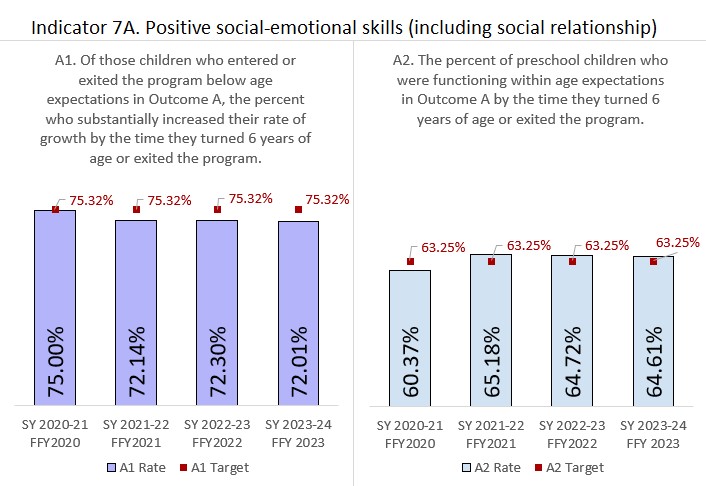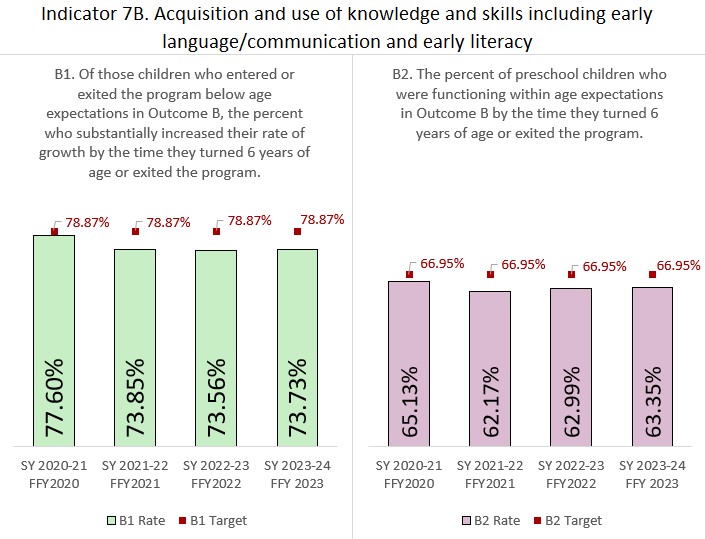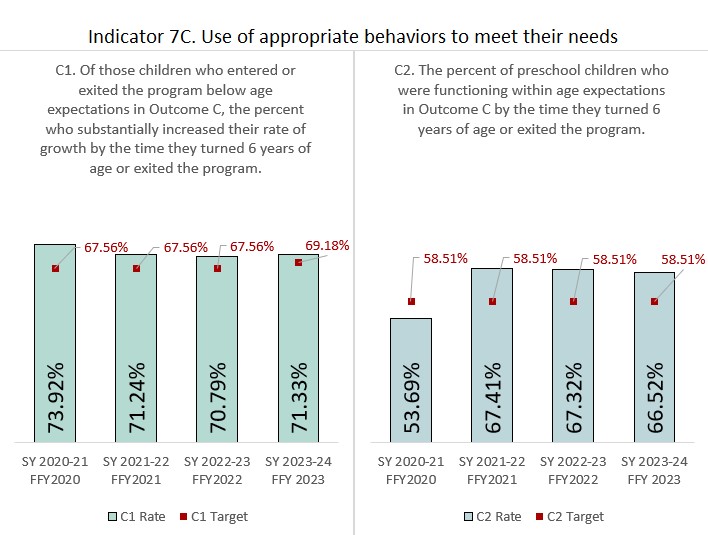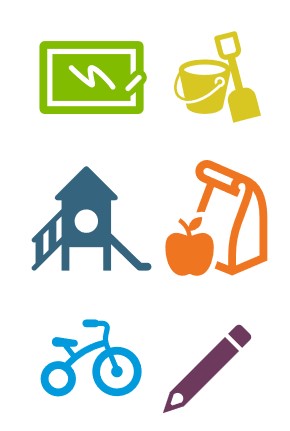CDE will be closed Wednesday, Nov. 27 through Friday, Nov. 29 for the Thanksgiving holiday.
You are here
Indicator 7 - Preschool Outcomes
Definition
Percent of preschool children aged 3 through 5 with IEPs who demonstrate improvement in the following areas:
- Indicator 7A. Positive social-emotional skills (including social relationships).
- Indicator 7B. Acquisition and use of knowledge and skills (including early language/ communication and early literacy).
- Indicator 7C. Use of appropriate behaviors to meet their needs.
(20 U.S.C. 1416 (a)(3)(A))
Measurement
The state must report on 3 outcomes:
A. Positive social-emotional skills (including social relationships);
B. Acquisition and use of knowledge and skills (including early language/communication and early literacy); and
C. Use of appropriate behaviors to meet their needs.
For each outcome, the state must report the percent of children who qualify for the following two summary statements:
Summary Statement 1: Of those preschool children who entered the preschool program below age expectations in each Outcome, the percent who substantially increased their rate of growth by the time they turned 6 years of age or exited the program.
Summary Statement 2: The percent of preschool children who were functioning within age expectations in each Outcome by the time they turned 6 years of age or exited the program.
How is Colorado doing on this indicator?
State Level
Administrative Unit Level
- Local Report of Summary Statement Data, 2023-2024 (Excel)
- Local Report of Summary Statement Data, 2022-2023 (Excel)
- Local Report of Summary Statement Data, 2021-2022 (Excel)
- Local Report of Summary Statement Data, 2020-2021 (Excel)
Targets for the Current SPP/APR Cycle
| Federal Fiscal Year (FFY) | 2020 | 2021 | 2022 | 2023 | 2024 | 2025 |
|---|---|---|---|---|---|---|
| Data from School Year | 2020-21 | 2021-22 | 2022-23 | 2023-24 | 2024-25 | 2025-26 |
| Target A1 >= | 75.32% | 75.32% | 75.32% | 75.32% | 75.32% | 76.81% |
| Target A2 >= | 63.25% | 63.25% | 63.25% | 63.25% | 63.25% | 64.92% |
| Target B1 >= | 78.87% | 78.87% | 78.87% | 78.87% | 78.87% | 80.28% |
| Target B2 >= | 66.95% | 66.95% | 66.95% | 66.95% | 66.95% | 68.58% |
| Target C1 >= | 67.56% | 67.56% | 67.56% | 69.18% | 70.80% | 72.42% |
| Target C2 >= | 58.51% | 58.51% | 58.51% | 58.51% | 58.51% | 60.22% |
Improvement Strategies
- CDE currently provides AUs with the Administrative Data Use Self-Assessment, an online resource, to monitor their own data use.
- CDE will develop a structured TA plan that includes the implementation of an evidence-based data-based decision-making and problem-solving process at the local level by using these critical questions: (SY2021-22)
- Accountability questions are the focus of the TA plan.
- What is the quality of the EC program where young children receive special education services? (inclusive practices and a standards-aligned curriculum are the outcomes that we expect)
- How do outcomes for children differ between service-delivery models (structures) and child outcomes?
- What do families report help their child develop and learn?
- CDE and the LEA will identify detailed roles and expectations in building a culture of data use.
- CDE will develop and provide a process flow for data analysis.
- CDE will provide data visualizations and training on data literacy
- Accountability questions are the focus of the TA plan.
- CDE is planning on providing individualized TA support to AUs in the implementation of collaborative planning and data-based decision-making. (SY2022-23)
- CDE is planning on identifying Promising Practices on data use and publishing them on the website. (SY2023-24)
Additional Resources
The feedback period has closed, this video is included for information on the target setting process.
For more information, contact:
Having trouble with this webpage?
If you have problems with broken links or accessing the content on this page, please contact the Exceptional Student Services Unit at [email protected]. Please copy the URL link for this page into the email when referencing the problem you are experiencing.







Connect With Us




